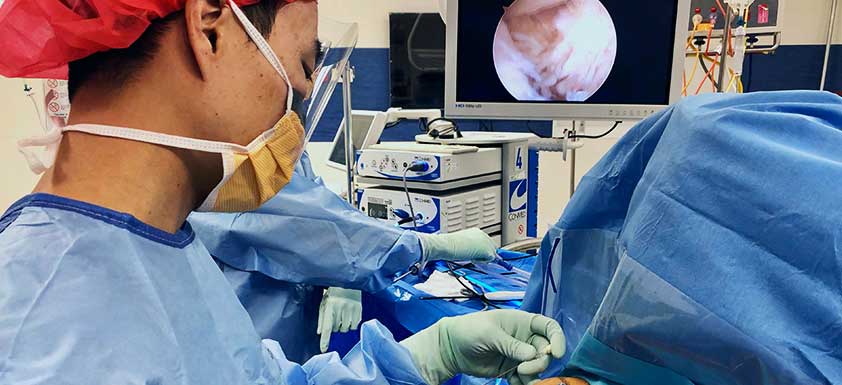Shoulder Arthroscopy
Shoulder arthroscopy (keyhole surgery) is a revolutionary alternative to traditional open procedures. In this method, a small camera, or arthroscope, is inserted through minor incisions, providing a clear view of the shoulder joint.
Compared to traditional open surgery, shoulder arthroscopy boasts several key advantages. The utilisation of small incisions and the arthroscope minimises tissue disruption, resulting in decreased post-operative pain and a quicker recovery. Additionally, the precision afforded by the arthroscope enhances the surgeon’s ability to visualise and address specific issues within the shoulder joint.
Mr. Soong Chua, having received specialised training from some of the world’s leading shoulder surgeons, is proficient in advanced arthroscopic techniques dedicated to addressing a range of shoulder issues including:
- Rotator cuff repair
- Rotator cuff repair with patch augmentation
- Superior capsule reconstruction
- Labral or SLAP repair
- Shoulder stabilisation
- Capsular release for adhesive capsulitis (frozen shoulder)
- AC joint stabilisation
- Subacromial decompression or bursectomy

Before the surgery
Before the procedure, Mr. Chua along with your anaesthetist ensures the selection of an optimal anaesthetic for your comfort. This typically involves a light general anaesthetic complemented by a regional nerve block to numb the specific area involved in your surgery. This combination not only facilitates a restful post-operative experience but also ensures effective pain control in the initial hours after the procedure.
After the surgery
Depending on the complexity of the surgery, you will either return home on the same day or stay overnight in the hospital. A supportive sling and waterproof dressings are applied, allowing you to shower immediately after surgery. Prescribed pain medications, overseen by the surgical team and hospital staff, aim to manage expected discomfort effectively.
Recovery
Before you leave the hospital, a physiotherapist will see you to initiate a post-operative exercise regimen, which will play a pivotal role in your recovery. This personalised approach enhances the rehabilitation journey, ensuring a comprehensive and successful recovery.
Recovery times vary based on the extent and type of repairs, as well as individual patient factors. For minor surgeries, strength can typically return after a short rehabilitation period, allowing a return to regular activities within a few weeks. However, major surgeries may require an extended rehabilitation period, and the overall recovery process may span over several months. Despite the gradual nature of recovery, strict adherence to post-surgery guidance is crucial for achieving successful outcomes.

